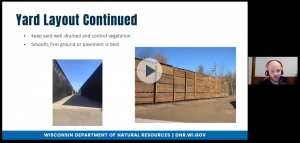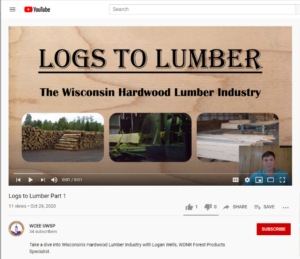The United States Department of Agriculture (USDA) announced new programs to bring financial assistance to producers, including assistance for timber harvesting and hauling firms, who were impacted by market disruptions caused by the COVID-19 pandemic. The USDA will re-open the Coronavirus Food Assistance Program (CFAP) signup for at least 60 days, beginning on April 5, 2021. Please visit the USDA Pandemic Assistance webpage for more information.
Forest Products News
There’s More To Panels Than OSB And Plywood
By Alex Anderson, DNR Forest Products Specialist, Rhinelander
When people think of wood-based panel products, plywood and oriented-strand board (OSB) usually come to mind. However, a vast array of panel products whose primary building block is wood do not fall under the auspices of plywood or OSB. Before we explore those, it’s important to understand the distinction between “structural” panels and “non-structural” panels.
As the name implies, structural panels are designed to bolster the strength, stiffness and resistance of the items they adhere to. Plywood, generally, is utilized in commercial structures, whereas OSB is more common in residential construction.
Both plywood and OSB function as cladding for roofs, walls and subfloors. In Wisconsin, various plywood manufacturers generally produce hardwood plywood for decorative applications, such as furniture, cabinets, pinblocks for pianos and many others. There are also two OSB manufacturers in Wisconsin that utilize OSB as a base for their siding product.
Alternatively, non-structural panel products are primarily represented by medium-density fiberboard (MDF), particleboard and hardboard. Like OSB and plywood, these panels are prized for their dimensional stability and textural consistency.
Continue reading “There’s More To Panels Than OSB And Plywood”
Federal Tax Credits Extended For Business-Scale Biomass Combined Heat and Power Systems
By Sabina Dhungana, DNR Forest Products Specialist, Madison
Were you shocked by your mill or plant’s power bill recently? Then 2021 might be a good year to consider adding a wood-fired combined heat and power (CHP) system or upgrading your existing biomass-fueled boiler system to add power generation capability.
Operators and managers of mills or other forest industry plants looking to reduce energy costs may qualify for the 30% energy tax credit included in the 2021 Federal Omnibus spending bill. Organizations may also be eligible by upgrading an existing biomass-fueled boiler system to add power generation capability. Biomass energy systems with more than 150 kW of electricity generation capacity may be eligible for the tax credit. To qualify for the energy tax credit, construction must start before Jan. 1, 2022.
Continue reading “Federal Tax Credits Extended For Business-Scale Biomass Combined Heat and Power Systems”
Forest Product Services Webinar Series
By Logan Wells, DNR Forest Products Specialist, Hayward
This winter, the Forest Products Services team hosted three webinars on different aspects of manufacturing lumber. Each webinar highlighted principles from the recently published Forest Products Technical Guides.
 Recordings of these webinars are available. These recordings expand on each topic, filling in some details about the industry.
Recordings of these webinars are available. These recordings expand on each topic, filling in some details about the industry.
We look forward to offering future webinars to highlight Wisconsin’s forest resources. Thank you to our partners Lake States Lumber Association Education, Northcentral Technical College and UW-Madison, for their help in putting together these resources and webinars.
Learn more via the Forest Products Technical Guides or watch the webinar recordings here:
http://bit.ly/WiForestProductsResources
Forest products webinar series
The Wisconsin Department of Natural Resources (DNR) Forest Products Services Team hosts a series of free webinars on hardwood lumber manufacturing. This series is for small sawmills and new businesses interested in learning more about the hardwood lumber industry.
An overview of recently published Forest Products Technical Guides will be the focus and other background information on each topic. Presentations will be 30 minutes, followed by 15 minutes for questions and discussion. Click the links below to register for the Zoom webinars. Once you register, you will receive a confirmation email and details on downloading Zoom for your computer or mobile device. If you have any questions, contact Logan Wells at logan.wells@wisconsin.gov or 715-490-3587.
Hardwood Grade Sawing:
Thursday, Jan. 28, 2021 at 7 p.m. CT
The first webinar topic will cover the basics of grade sawing logs. We will discuss specific techniques for positioning a log, when to turn the log to another face and different sawing patterns.
Register at: https://us02web.zoom.us/meeting/register/tZIlc-qorjMjGtLIMl_jYAyX_FOfuODSZZ51
Edging & Trimming Lumber:
Tuesday, Feb.16, 2021 @ 7 p.m. CT
You can lose significant lumber value and volume with improper edging and trimming. This presentation will dive into generally accepted best practices on how much wane to leave on your lumber. We will also highlight lumber measurement and industry terms and how they relate to manufacturing.
Register at: https://us02web.zoom.us/meeting/register/tZMrdu2vpz0uGdzf22jJkYbE-dc4khK6csBM
Air Drying Lumber:
Thursday, Mar. 11, 2021 @ 7 p.m. CT
There are many benefits to drying lumber. This webinar is loaded with practical tips on how to set up an air-drying yard best. Reducing the moisture content through low-cost air drying is a great way to reduce kiln time and add value to your lumber.
Register at: https://us02web.zoom.us/meeting/register/tZYsdO-hqD0qE90kyCpz87nx35VM4il1zGGi
Virtual platform for workforce development
By Logan Wells, Forest Products Specialist
A specific area that has posed a significant challenge for schools has been integrating virtual instruction for Career and Technical Education (CTE) classes. CTE curriculum requires hands-on learning for careers such as woodworking, basic construction, natural resource management and other agriculture fields. The challenge with an online format for CTE is that students miss out on practical, hands-on experience. This is a daunting task for CTE teachers to find lessons that help students understand and practice career skills without the in-person exercises at schools.
During a normal school year, members of the Forest Products Services team would typically answer guest speaking requests at high schools to help raise awareness of careers in the forest products industry. Given virtual learning and safety guidelines (and with the help of digital presentations and videos), our program was able to turn an in-person school presentation into a short set of online videos that explain the process of primary products, such as turning a log into lumber. Despite my own technology limitations, this still is a helpful resource for CTE teachers searching for virtual assignments and activities.

Logs to Lumber YouTube videos hosted by the Wisconsin Center for Environmental Education at UW-Stevens Point.
These videos, hosted by the University of Wisconsin Center for Environmental Education, will remain valuable even when districts return to in-person learning. Certainly, a live guest speaker is preferred to a video, but it is our hope that these videos will reach a wider audience across the state. These videos can also help set the stage for students to take part in a mill visit or bring in guest speakers from the industry to focus on specific career skills like the basics of hardwood lumber grading.
Please feel free to check out the Logs to Lumber YouTube videos using the link here. Alternatively, you can search “Logs to Lumber UWSP” in Youtube.
If you have any questions, comments or feedback on these efforts, please don’t hesitate to reach out to Logan Wells, DNR Forest Products Specialist, at 715-490-3587 or Logan.Wells@wisconsin.gov.
Federal grant opportunities
United States Department of Agriculture (USDA) Wood Innovations Grant
The USDA Forest Service Wood Innovations Program is a funding opportunity supporting traditional wood utilization projects, expanding wood energy markets and promoting wood as a construction material. The grant supports proposals that significantly expand and accelerate wood energy and wood products markets throughout the United States to address forest management needs on National Forest Systems and other forest lands. The deadline to submit wood innovations grant proposals is Jan. 20, 2021.
USDA Community Wood Energy and Wood Innovations Grant
If you are looking for financial assistance for woody biomass energy projects, please explore 2021 Community Wood Energy and Wood Innovation funding opportunity request for proposals. The competitive grant can provide funds for shovel-ready projects such as installing a thermally led community wood energy system or building an innovative wood product facility. The deadline to submit Community Wood Energy proposals is Feb. 3, 2021.
More information regarding these funding opportunities, including the requests for proposals, instructions and the pre-application webcast are on the US Forest Service Wood Innovations web page.
Upcoming forest products events
International Mass Timber Conference
March 30 – April 1
Location: Virtual
Local-Use Dimension Lumber Grading Workshop
May 13 (Course date is subject to change. Class may be postponed or rescheduled as a result of the most current COVID-19 health and safety guidelines.)
Location: Green Bay area (venue TBD)
Celebrate Wisconsin’s Working Forests
Forest Products Week (celebrated on October 18-24, 2020) recognizes the people who work in and care for our forests, the businesses that create forest products and the many ways forest products contribute to our lives. In addition to celebrating the positive impact of Wisconsin’s forest products sector on the state’s economy, Forest Products Week recognizes the myriad forest products ingrained in our daily lives.
Facts to celebrate:
- Forest products contribute $24.4 billion annually to the state’s economy.
- Forests directly provide more than 60,000 jobs for Wisconsin residents with a payroll of $4.2 billion.
- Forestry is the number one employer in 7 counties.
- Every forestry job supports 1.7 additional jobs in the state.
- More than 1,200 forest products companies in Wisconsin make products we use every day – from paper products such as food packaging, fine writing paper and tissue paper, to lumber used for homes and furniture.
- Emerging forest products such as mass timber, nanocellulose and biochemicals are beginning to unlock innovative uses for wood that may help the state’s industry further diversify in the future.
The Wisconsin DNR-Division of Forestry is proud to help Wisconsin’s forest industry build and maintain strong markets while ensuring that forests remain a vital part of the state’s economy and culture for future generations. To learn more, search the DNR website, dnr.wi.gov, for “forest businesses.”
Forest products session for educators
Forest Products Specialist Logan Wells will visit with Wisconsin educators at noon on October 8, 2020 on the theme of “Celebrating Wisconsin’s Forest Products.” The webinar, offered by LEAF (Wisconsin’s K-12 Forestry Education Program), is open to anyone but advance registration is required (registration link).
In his presentation, Logan will explore products made from forests in Wisconsin and the importance of markets to sustainable forestry. He will also discuss global marketplace impacts and other changes impacting the industry, how Wisconsin producers are adapting to change, and share information about innovative products on the horizon.
Forest Products Week is the third week of October, so start planning now to showcase how vital forest products are to Wisconsin.
